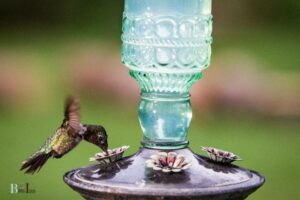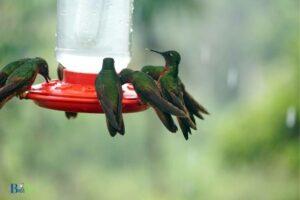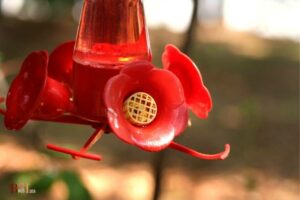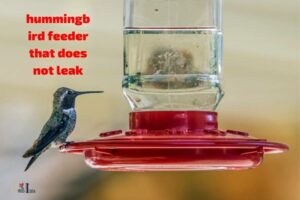How to Stop Hummingbirds from Fighting Over Feeders: Guide
To stop hummingbirds from fighting over feeders, you should provide multiple feeders, space them apart, use different feeder styles, and create natural barriers.
Hummingbirds can be territorial and aggressive when it comes to defending their food sources, which can lead to fighting over feeders in your garden. This behavior is especially prevalent during migration and nesting seasons when energy demands are high.
To ensure harmony among these tiny birds and uninterrupted feeding, you can follow several strategies to minimize conflicts and discourage aggressive behaviors.
By implementing these strategies, you can promote peaceful coexistence among hummingbirds in your garden and ensure they all have access to essential food sources.
Providing multiple feeders, spacing them apart, using different styles of feeders and creating natural barriers not only helps to reduce competition and fighting but also contributes to
8 Solutions to Stop Hummingbirds from Fighting Over Feeders:
| Solution | Description | Effectiveness |
| Multiple feeders | Place multiple hummingbird feeders around your yard or garden, spaced apart. | High |
| Visual barriers | Add plants, decorations, or other visual barriers between feeders to prevent birds from seeing each other. | Moderate |
| Feeder placement | Place feeders at different heights and locations to allow for different territories. | Moderate |
| Perch removal | Remove perches from feeders to discourage territorial behavior. | Low |
| Feeder type | Use feeders with multiple feeding ports to allow more birds to feed at the same time. | Moderate |
| Timing | Refill feeders at different times throughout the day to disrupt territorial behavior. | Low |
| Colorful plants | Plant colorful flowers around the yard to attract more hummingbirds, dispersing attention from feeders. | Moderate |
| Feeder rotation | Regularly change the locations of your feeders to prevent territorial behavior. | Moderate |
Key Takeaway
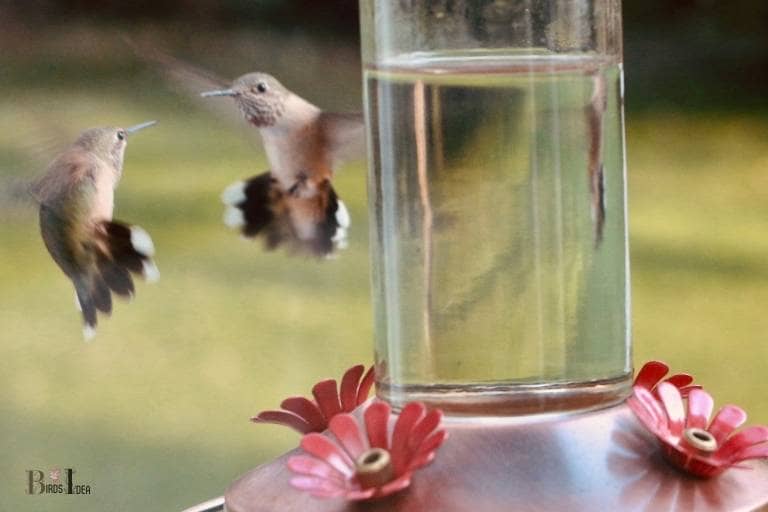
Five Facts About: Stop Hummingbirds from Fighting Over Feeders
Understanding Hummingbird Feeder Behavior
Hummingbirds are fascinating creatures that are delightful to watch. Their incredible speed adds to their charm, but it can result in fighting if they feel their food source is threatened.
To stop hummingbirds from fighting over feeders, it is essential to understand their behavior.
What Attracts Hummingbirds To Feeders?
Certain factors attract hummingbirds to feeders and keep them coming back. These factors include:
- Bright colors: Hummingbirds are attracted to bright colors, so choose feeders that are red, pink, or orange.
- Nectar quality: Hummingbirds rely on nectar for their source of food. Make sure your feeder has fresh and high-quality nectar.
- Location: Hummingbirds prefer feeders that are placed in a location that is convenient for them to access and also safe from predators.
- Perches: Hummingbirds need perches to rest when they are not feeding. Make sure your feeder has perches that are easy for them to access.
Why Do Hummingbirds Fight Over Feeders?
Hummingbirds are territorial birds, which means they are highly aggressive when it comes to defending their food source. Fighting occurs when the food source is threatened, and hummingbirds typically become more aggressive during the breeding season.
Fighting is often because of the following reasons:
- Limited resources: When there are many birds and limited feeders, each hummingbird will become aggressive to protect its territory.
- Lack of space: Small feeders with limited ports can cause fighting among hummingbirds as they struggle for their turn to feed.
- Dominant birds: Some hummingbirds may be more territorial and dominant, leading to fighting, while others may be more passive.
The Negative Consequences Of Hummingbird Fighting
Hummingbird fighting can result in negative consequences for these birds and the environment.
The negative effects include:
- Injuries: Hummingbirds may get injured during a fight, and these injuries can, in some cases, result in death.
- Energy loss: Hummingbirds require large amounts of energy to fight, which can affect their overall health and weaken them.
- Feeder abandonment: If the fighting becomes too intense, hummingbirds may abandon the feeder entirely, leaving them without a vital food source.
Understanding hummingbird behavior is crucial to stop them from fighting over feeders. Providing a suitable environment and feeder that meets their needs can help prevent fighting and provide a welcoming home for them.
How To Create A Safe Environment For Hummingbirds
Hummingbirds are one of the smallest and most delicate birds with colorful feathers. They require a safe environment to visit feeders and consume their nectar without getting into a fight.
Below are some tips to create a secure space for hummingbirds to avoid conflicts while feeding.
Proper Placement Of Feeders
Hummingbirds are very territorial and protective when it comes to food, especially if they feel it’s scarce. Therefore, proper placement of feeders is important.
Below are some recommended tips:
- Place feeders in a visible spot with good coverage that is easy to access
- Make sure that feeders are far apart from each other
- Place feeders in open spaces where birds feel safe from potential predators
Providing Adequate Food And Shelter
Hummingbirds are active birds that require large amounts of food proportional to their body size. Regular feeding is vital to avoid fights for food.
Below are some tips to make sure there is enough food and shelter:
- Use large feeders to accommodate several hummingbirds at once
- Provide fresh nectar daily and place feeders in the shade to keep the nectar fresh
- Plant some flowers around the feeders to attract hummingbirds and provide a natural food source
- Provide enough shelter for the hummingbirds where they can rest after feeding and feel safe from harm.
Avoiding Potential Obstacles And Hazards
Hummingbirds are fast flyers, but they can collide with obstacles or get caught in dangerous situations, such as windows or spider webs. Neglecting these potential hazards can cause injury or even lead to death.
Below are some tips to avoid potential obstacles and hazards:
- Place feeders near windows only if their visibility is reduced using translucent or opaque stickers
- Clean feeders regularly to prevent mold buildup or bacterial infections
- Avoid using pesticides or chemicals near the feeders or the sheltered areas where the hummingbirds nest
- Check the area for spider webs and remove them regularly to prevent hummingbirds from getting trapped.
With these tips, you can create a safe haven for your hummingbird visitors.
Remember to keep the feeders clean and fresh, provide enough shelter and natural food sources, and avoid potential hazards to protect hummingbirds and keep them coming back.
Strategies For Minimizing Hummingbird Conflicts
Hummingbirds are beautiful and fascinating creatures that visit our gardens for sugar water. Unfortunately, they can become very territorial and aggressive, which can cause conflicts at the feeder. However, there are some strategies that can minimize these conflicts.
Let’s look at some of them.
Choosing The Right Type Of Feeder
The type of feeder you choose can impact the behavior of the hummingbirds.
Here are some tips:
- Opt for a feeder with multiple ports as it can accommodate more birds, which minimizes competition. You can also choose a feeder with bee guards as they can prevent bees from hogging the nectar.
- Avoid using shallow feeders as they can create chaos. Instead, use a feeder with deep reservoirs as it reduces the number of refills and the need for frequent feeder visits.
- Hummingbirds prefer red colored feeders, as the color catches their eye. But you can also opt for a feeder that isn’t brightly colored to avoid attracting too many hummingbirds.
Managing Feeder Time Slots And Placement Options
Hummingbirds are creatures that thrive on schedules.
Here are some tips:
- Establish a feeding routine and stick to it daily. Fill the feeder with fresh sugar water every day and at the same time.
- Place your feeder in a shady spot, as it can keep the sugar water cooler and fresher. Plus, it will keep the birds cool and refreshed.
- You can also situate your feeders in different locations around the yard to give the birds a choice of feeding areas and avoid overcrowding in one place.
Using Multiple Feeders And Spacing Them Out
Using multiple feeders can reduce the need for hummingbirds to fight over a single feeder.
Here are some tips:
- Use several feeders around the yard, far apart as this can minimize territorial behavior and give the birds more space to feed.
- Place feeders in different spots around the yard, such as by a window or a shady tree. This allows the birds to find them easily and visit when they need a sugar water hit.
Creating a perfect hummingbird environment requires a little thought, but the payoff is well worth the effort.
With the right feeder and placement, you can minimize conflicts and enjoy the vibrant beauty of these tiny birds.
Diy Repellants And Deterrents For Hummingbirds
Hummingbirds are fascinating creatures that bring joy to any garden. However, feeding these little birds can sometimes lead to aggressive behavior, with hummingbirds fighting for a spot at the feeder.
This behavior can be very troubling for bird watchers and often leads to injured hummingbirds.
The good news is that there are several diy repellants and deterrents that can effectively stop hummingbirds from fighting over feeders.
Natural Ingredients That Hummingbirds Dislike
Hummingbirds have a keen sense of smell and are very picky eaters. Therefore, there are several natural ingredients that you can use to repel hummingbirds from the feeder.
- Mint extracts and oils: Mint is a natural deterrent that hummingbirds do not like. You can hang dried mint near the feeder or mix peppermint oil with water and spray it near the feeder.
- Cinnamon: Cinnamon is another natural repellent that can keep the hummingbirds away. Sprinkle cinnamon powder near the hummingbird feeder or hang a cinnamon stick near it.
- Garlic: Hummingbirds do not like the smell of garlic. You can crush garlic cloves and mix them with water to repel hummingbirds from the feeder.
- Hot sauce: Adding a few drops of hot sauce to the nectar can make it unappetizing to hummingbirds.
Implementing Visual Deterrents Near Feeders
Visual deterrents are another great way to keep away aggressive hummingbirds.
These deterrents mimic predators and warn the hummingbirds to stay away from the feeder.
- Hang shiny objects: Hummingbirds are attracted to shiny objects, but hanging shiny reflective items around the feeder can keep them away. You can hang reflective tape or cds from tree branches or the feeder.
- Install fake predators: You can install fake predators like owls or hawks near the bird feeder. These predators will scare away the hummingbirds, but make sure to move them around occasionally so that the birds don’t become accustomed to them.
- Use colored ribbons: You can hang colored ribbons near the feeder. These ribbons will flutter in the wind, scaring the hummingbirds away.
Ways To Limit The Presence Of Aggressive Hummingbirds
Sometimes, the best way to prevent fighting among hummingbirds is to limit their presence around the feeder.
Here are some ways to achieve this.
- Use multiple feeders: By hanging multiple feeders, you can give each hummingbird their own feeding station, which reduces competition and aggression.
- Change the location of the feeder: You can change the location of the feeder to a spot that is less accessible to aggressive hummingbirds. It is recommended to hang the feeder near a bush or shrub, so the hummingbirds can hide if they feel threatened.
- Use smaller feeders: Using smaller feeders means that the hummingbirds are not crowded together, which can reduce fighting.
With these diy repellants and deterrents, you can stop hummingbirds from fighting over feeders. By using natural ingredients, visual deterrents, and limiting their presence, you can ensure that these fascinating creatures can be enjoyed without harming each other.
FAQ For How To Stop Hummingbirds From Fighting Over Feeders
How Do I Stop Hummingbirds From Fighting Over My Feeders?
What Types Of Food Should I Put In My Hummingbird Feeder?
How Often Should I Clean My Hummingbird Feeder?
How Can I Make My Hummingbird Feeder Less Attractive To Bees?
Conclusion
Stopping hummingbirds from fighting over feeders is not an impossible task. Hummingbirds are territorial birds, and this often leads to fights over food sources. However, you can take measures to reduce this aggression.
Firstly, provide multiple feeding sources for the birds, which will help decrease competition among them.
Secondly, use feeders with enough perches and ports to accommodate many birds at once. Also, ensure that your feeders are well-spaced, and place them away from windows and mirrors to prevent collisions.
Lastly, clean your feeders regularly to prevent the spread of diseases that can lead to aggression.
By following these guidelines, you can create an environment that promotes peaceful and harmonious interactions among hummingbirds. So enjoy watching these beautiful birds without having to worry about their aggressive behavior, and provide them with a safe and healthy feeding environment.

